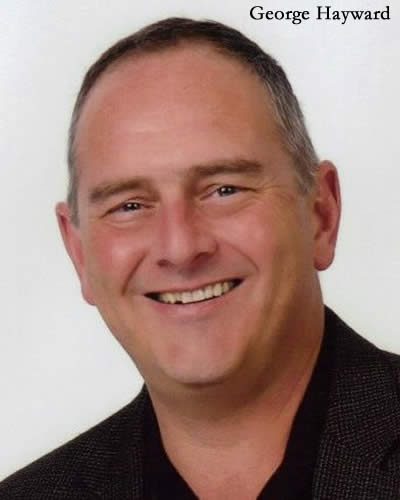 George Hayward is the author of the fiction novel SOUL AFFLICTED, a godless man’s search for hope and faith.
George Hayward is the author of the fiction novel SOUL AFFLICTED, a godless man’s search for hope and faith.
A native of Lynn, Mass., Hayward’s writing career began during his early college years as journalism major, when he interned at the Boston Globe and covered high school sports and features for his hometown newspaper, the now-defunct Lynn Sunday Post. In 1987 he began a 12-year stint in the U.S. Air Force that included assignments in Colorado Springs, Alaska, Kuwait and San Antonio. The last nine of those years were as an award-winning journalist. He was the 1993 Air Force Journalist of the Year, and was a four-time Journalist of the Year at the regional level. The Air Force twice named him its editorial and commentary writer of the year, and he won the Department of Defense’s Thomas Jefferson Award for commentaries in 1991.
In 1999 he left the service to work in media relations for NASA, first in Alabama and then in Palmdale, Calif. After a short stint in public relations for a major Los Angeles aerospace company, he moved in 2002 to Honolulu. There, he began writing SOUL AFFLICTED while working as p.r. manager at major resort on Waikiki Beach and writing the occasional free-lance article for Midweek, Hawaii’s largest-circulation newspaper. He returned to Colorado Springs in 2004, where he finished SOUL AFFLICTED, and now works for a nonprofit that provides emergency financial aid to needy veterans and military families.
Bijan Tehrani: How did you come up with the idea of SOUL AFFLICTED?
George Hayward: About 15 years ago, I was going through a period of significant spiritual awakening after many years as an atheist. I had been working on a book project that was a collection of short stories with the central theme of awakening, redemption and self-awareness, and I came to see two of the rough story concepts as book-ends to a larger tale. The first was about a godless womanizer who comes to believe his latest “target” is actually an angel sent to save him, and the other was about a man who goes to Hawaii to commit suicide and instead finds salvation. Those ideas evolved into parts one and three of SOUL AFFLICTED.
BT: You have worked in media relation field for a long time that always means dealing with other people, how that has helped you in writing your book?
GH: My background in media and public relations gave the story a setting, both physical and for Ariel’s internal struggles. At the time I started writing the book, I was the public relations manager at the Hilton resort on Waikiki Beach in Hawaii. I also was familiar with Ariel Parisi’s hotel, The Broadmoor, which is a real, 5-star resort in Colorado Springs, because I had previously lived eight years in Colorado Springs while serving in the US Air Force. So, much of Ariel’s professional life at The Broadmoor was adapted from my real-life experiences on my own job in Hawaii. But just as important to the story is the effect that his p.r. position had on Ariel’s massive ego. Putting him in such a posh job provided ample breeding ground for the deadly sin of vanity that clouded his soul.
BT: Do you know someone like the main character of your book? Reading the book we find Ariel so real.
GH: I’ve been asked many times if Ariel Parisi is me, or more specifically, if that’s what I was like many years ago, before finding my faith in God. Two decades ago, I was an arrogant ass, to be honest, and some pieces of Ariel’s life are reflections of my own experiences, both physical and spiritual. For instance, like Ariel, I grew up in the Boston area, with a large Italian family on my mom’s side. The scene where Ari announces his atheism at the family dinner table was a true event straight out of my own adolescence. And, Ariel is my middle name. But much of Ariel’s life is pure fiction, so while SOUL AFFLICTED is not an autobiography, it is an expression of how my own views of God and faith evolved. Through Ariel, I explore questions about both faith and atheism in ways that I think most people can relate to, regardless of their own beliefs.
BT: Have places that you have lived at an effect in your book?
GH: I’ve lived in most of the US states or communities mentioned in SOUL AFFLICTED… Massachusetts, Florida, Colorado, Hawaii, even the towns of Lancaster and Redondo Beach in the Los Angeles area. While I was writing the book, I drove from L.A. to Colorado Springs, the reverse of Ariel’s journey through the deserts. Rather than using the speedy and convenient interstate highways, I took the same back roads and desert highways that Ariel wandered, turning a two-day road trip into a week-long exploration. Virtually all of the places in Ariel’s journey are real, even Hallelujah Square. It’s in the desert somewhere between Las Cruces and Phoenix, though I don’t remember exactly where.
BT: Reading the book, you see cinematic elements in it, it has a visual approach, do you like movies and cinematic structure? Are you interested to see it as a movie?
GH: I love a movie or story that makes you think and keeps you wondering what plot twist comes next, whether it’s a comedy, drama or any other genre. I tried to do that in SOUL AFFLICTED through the use of serendipity, coincidence and ambiguity. For instance, whether or not you think Hope is real depends on how you interpret what Ariel sees. Is she an angel, a woman, or a figment of his imagination? Is God showing him Signs, or is he seeing what he wants to see in everyday things? Hope is written, only and always, from Ariel’s point of view. Yet her presence is tangible, and each of her appearances and disappearances is plausible in the real world. So no matter how a reader interprets Hope and Ariel’s “affliction,” the story still makes sense. At least, that’s what I tried to do. Ultimately, I would love to see SOUL AFFLICTED as a movie… that would mean that the story has touched someone deeply.
BT: You are now working in the nonprofit organization that is based on a humanistic cause, did you accept the job as an influence of SOUL AFFLICTED on yourself?
GH: I would say that both SOUL AFFLICTED and my current work with The Home Front Cares spring from my growth as a person. The book is an expression of my own spiritual journey. The job is certainly about passion. I’d become jaded after two decades in p.r., whether it’s for government, corporate or agency work. It’s hard to do good work and enjoy what you do, when you don’t necessarily believe in, or are at best feel neutral about, what you are promoting. It’s wealth of the soul versus wealth of the pocket or ego. Early in life, I was more focused on the latter. Now I’m a happier and more spiritually grounded person, focusing on the soul.
BT: What is your next book project?
GH: I’m not ready to share details yet.

